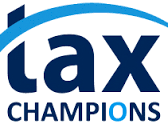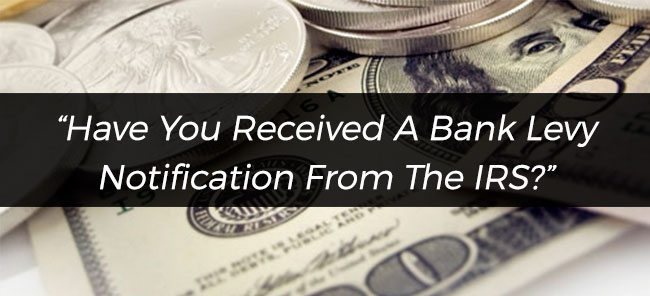How to stop IRS bank levy or wage garnishment
If you are facing a Bank Levy or Wage Garnishment, it is important to act as quickly as possible.
Here's what you can do.
Every year by the tax deadline, taxpayers are required to file a return and pay their fair share of taxes.
If the deadline is missed and taxes are owed, the IRS will impose penalties and interest begins to accrue.
But that’s not all; the IRS begins collection efforts immediately, as well.
Collection efforts consist of written communication sent to the taxpayer’s last known address.
If these notices don’t result in payment of the overdue tax, more aggressive collection efforts, such as a bank levy or wage garnishment, are explored.
A revenue agent examines the assets and income of the taxpayer to determine which resource will return the full balance of the debt with the least amount of effort.
The taxpayer may have several resources from which the IRS can collect the debt, but some require a more complicated process than others.
For example, a taxpayer who owes a balance of $5,000 may own a vacation home, a boat, a retirement account, a bank account and have bi-weekly wages.
The IRS has the legal right to seize and sell a home or boat to cover the debt or withdraw the funds from one of the taxpayer’s accounts, as well as garnish a portion of his or her wages.
Rather than seize and sell property, a bank levy or wage garnishment offers a more straightforward process in which to obtain payment from the taxpayer.
Stopping An IRS Bank Levy
If no response is received after written notification is generated by the IRS, they’ll send a Final Notice of Intent to Levy, which includes a Notice of Your Right to A Hearing by mail or one will be delivered in person at the taxpayer’s last known work or home address.
This indicates that the IRS will move forward with the levy if no response is received within 30 days.
To move forward with a bank levy, the IRS notifies the bank and the bank freezes the funds in the taxpayer’s account.
This means that the funds may not be withdrawn by the taxpayer.
The freeze remains in place for 21 days, giving the taxpayer another opportunity to reach out to the IRS to settle the debt.
If the debt isn’t settled after 21 days, the bank withdraws the funds from the taxpayer’s account and forwards them the IRS.
If there aren’t enough funds in the account to pay off the back-tax balance, the levy will remain in place until enough funds have been withdrawn to settle the debt.
Although the IRS provides ample opportunity for the taxpayer to contact them to resolve the debt, this isn’t enough to remove the levy.
The taxpayer must then commit to a satisfactory payment arrangement with the IRS.
Stopping an IRS Wage Garnishment
Like an IRS bank levy, the IRS sends a notice of an intent to garnish or levy wages before acting.
If they don’t receive a response from the taxpayer within 30 days, they will notify his or her employer that a portion of their employee’s wages must be withheld every pay period and sent to the IRS to resolve a back-tax debt.
Wage levies can also be stopped by contacting the IRS and committing to a satisfactory payment arrangement, however; if a taxpayer can’t afford to make the monthly payments on their debt, a wage garnishment often creates a financial hardship.
Other options may be available in these cases.
What to do When a Final Notice of Intent to Levy is Received
First, take a deep breath.
Receiving a Final Notice of Intent to Levy from the IRS can feel overwhelming, especially when the threatened funds are heavily relied on for the taxpayer’s basic needs or those of young dependents.
The good news is, help is available, and you have options.
Contact a reputable tax professional to help you develop a response before contacting the IRS.
The IRS operates on a perpetual objective to collect as much of the full debt as possible.
Having a tax professional on your side allows you to develop a response that is more likely to result in a fair and affordable payment arrangement.
The credentialed staff at Tax Champions has been negotiating with the IRS for over 35 years and our experience affords us a unique ability to secure the resolution with the lowest payments that you qualify for.
Our savvy knowledge of IRS procedure helps us to craft a resolution that not only results in affordable payments but also other benefits you may qualify for.
Give us a call for your free consultation today.
We’ll discuss your personal case and go over the best options that are available to you, although there’s no obligation to hire our firm.
If you determine that our firm is a good fit for your needs, we’ll act immediately to protect you from the bank levy or wage garnishment and all other collection efforts.
You can reach us at 800.518.8964 or send us your contact information in the blue box on the right side of this page. We’re available seven days a week during the day and evening for our clients’ convenience. Call or click today.
Sources
[1] What if a levy on my wages is causing a hardship? (2018, November 5). Retrieved from //www.irs.gov/newsroom/what-if-a-levy-on-my-wages-is-causing-a-hardship

